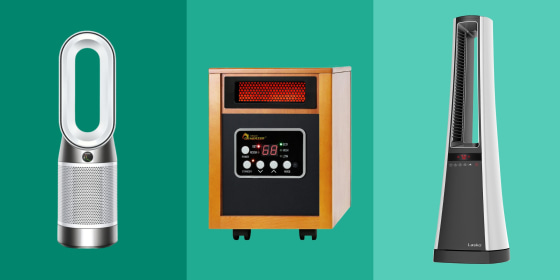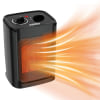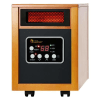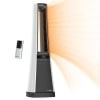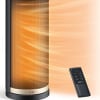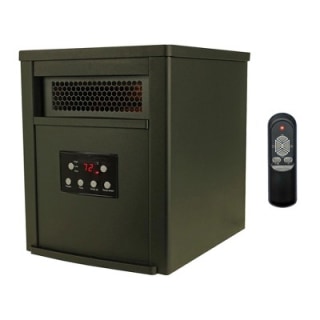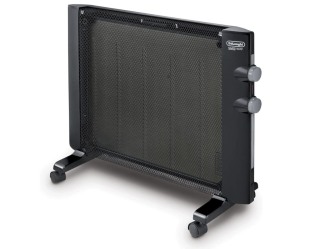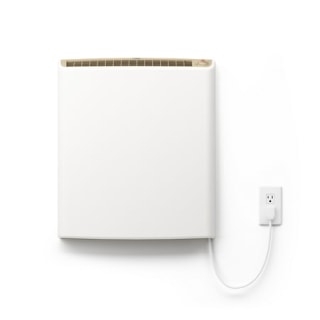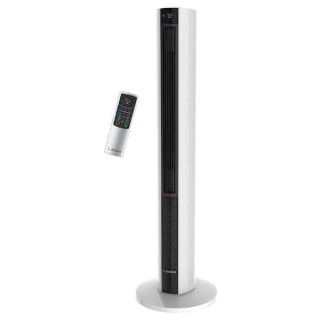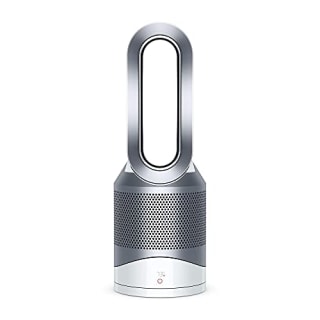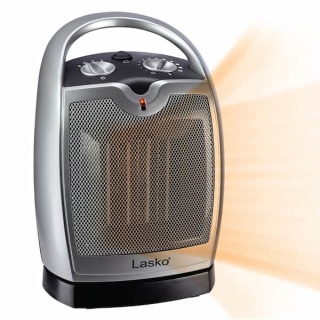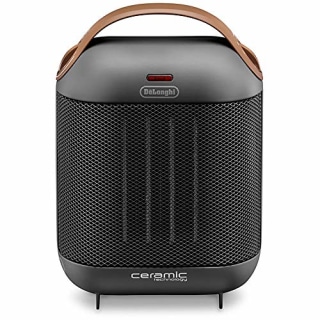Space heaters are a fast and economical way to warm up your home when temperatures dip — and they can be a beneficial tool to keep on hand in case of emergencies. Whether it’s a drafty bedroom or outside on the patio during a cool night, these portable devices allow you to bring an effective boost of heat wherever you need it.
SKIP AHEAD How I picked the best space heaters | The best space heaters | How to shop for a space heater | Space heaters and safety | Why trust NBC Select?
To determine the best space heater for you, I spoke to home and safety experts about the benefits of space heaters, what features to look for when shopping for one and how to use them safely.
How I picked the best space heaters
There are several factors to consider when choosing a space heater. Here’s everything I kept in mind when making this list:
- Type: The main types of space heaters are radiant, convection and combination. Radiant heaters primarily warm what’s directly in front of them with infrared heat rather than your entire home or room. A convection heater is more suited to heating a room or large space. A combination heater has a fan that propels hot air outward to heat a home — they’re louder than radiant and convection ones, but less of a fire hazard, according to our experts. All three types of space heaters are included in the list below.
- Testing: Like with many home appliances, space heaters are tested by independent quality assurance agencies, mainly the Underwriters Laboratories (UL) or the Electrical Testing Laboratories (ETL), to ensure they meet the agency’s safety requirements. All of the space units below have either UL or ETL certification.
- Wattage: The power of a space heater is measured in watts. The higher the wattage, the more powerful it is and the larger of a space it can heat, according to Arie Van Tuijl, a licensed home inspector and founder of home-maintenance website Home Inspector Secrets. Tuijil generally recommends buying a space heater that is in the 500-1,000 watts range for smaller rooms (which are typically considered 120 square feet or less), and between 1,000 and 1,500 watts for larger rooms. The list below includes space heaters with wattage ranging between 500 and 1,500.
- Safety features: Space heaters can be potential fire hazards, so it’s important that they include safety features like protective grills and an auto shut-off feature. Many of the space heaters listed below have an auto shut-off feature, tip-over safety feature or protective grill.
- Warranty. Most space heaters come with a warranty so you can be sure that the product is returnable or replaceable if something happens to it, according to Glenn Wiseman, sales manager of Top Hat Home Comfort Services in Ontario. I included all of the warranties for the units below, where possible.
Want more from NBC Select? Sign up for our newsletter, The Selection, and shop smarter.
The best space heaters of 2025
To give you an idea of the space heater choices out there, I rounded up expert-recommended options at various price points.
Editor’s pick: Jndro Portable Electric Space Heater
- Small
- Quiet
- Best for small spaces
This space heater comes recommended by NBC Select SEO editor Nikki Brown, who loves how quickly it warms up. “This heater is small but it packs a punch. On the highest level, it heats up a large room in under an hour,” she says. “There’s also a mechanism on the bottom that can gauge if it’s sitting on a flat surface or not. If it’s not, it will automatically turn off, which I love.” The heater is made of flame-resistant material and can heat a room up to 200 square feet, according to the brand.
Type: radiant | Safety features: tip-over protection, auto shut-off | Testing: ETL | Warranty: n/a
Best radiant space heater: Dr. Infrared Heater Portable Space Heater
- Runs quietly
- Good temperature accuracy
- Cost effective
- Only high and low settings
Wiseman recommends this portable infrared model for its dual heating system and built-in thermostat that ranges from 50 to 85 degrees Fahrenheit. The energy-saving space heater offers 1,500 watts and is powered through an electric cord with 120 volts, which can evenly heat a 150-square-foot room, he said. It also has an automatic 12-hour shutoff timer.
Type: radiant | Safety features: auto shut-off | Testing: UL | Warranty: 1 to 3 years
Best radiant space heater for large rooms: Lifesmart 6 Element Heater
- Has wheels on the bottom
- Lightweight
- Too big for a small room
For spaces ranging up to 150 square feet, Van Tuijl recommends this Lifesmart infrared space heater, which has a maximum setting of 1,500 watts. It includes a remote, a 12-hour timer and three different heat modes. It also includes an ”eco setting,” which the brand says maintains a constant 68-degree temperature using less power for when you want to bring it into a smaller room.
Type: radiant | Safety features: tip-over safety feature | Testing: ETL | Warranty: 3 years
Best panel radiant space heater: De’Longhi Mica Thermic Panel Heater
- Works quickly
- Sleek and minimal design
- Nothing to note at this time.
The nice thing about this lightweight, compact space heater is that it can either be mounted on the wall or set on the floor. It also comes with wheels so you can easily move it from room to room. It packs a powerful punch with 1,500 watts of heat and has an adjustable thermostat and multiple heat settings so you can personalize for your comfort, according to the brand.
Type: convection | Safety features: auto shut-off | Testing: n/a | Warranty: 1 to 2 years
Best wall-mounted convection space heater: Envi 120v Plug-in Electric Panel Wall Heater
- Quiet operation
- Better for small spaces
Van Tuijl recommends this wall-mounted, convection space heater, which has a temperature-controlling thermostat and the brand’s Wall-Sens technology, which cuts out the power for safety when the unit is removed from the wall, according to the brand. The unit, which Envi says heats rooms between 130 and 150 square feet, is just 2 inches thick and can automatically dim the power light in dark rooms.
Type: convection | Safety features: temperature-controlling thermostat | Testing: UL | Warranty: 3 years
Best tower convection space heater: Lasko Electric Tower Heater
- Easy to use
- Quiet operation
- Better for small spaces
This Lasko space heater has a bladeless design at a more affordable price than similar brands, like Dyson. Lasko says it’s equipped with a slew of safety features, including a safe touch surface and an automatic 8-hour shut-off switch. With its quiet oscillating mode, this tower can evenly distribute heat in rooms up to 300 square feet, according to the brand.
Type: convection | Safety features: safe-touch surface and automatic 8-hour shut-off switch | Testing: ETL | Warranty: 3 years
Best combination space heater: Lasko All-Season 1500-Watt Electric Oscillating Space Heater
- Oscillates
- Comes with a remote
- Has multiple fan speeds
- Only for up to 150 square feet
This oscillating tower unit, which has a 4.2-star average rating from 370 reviews at The Home Depot, is both a space heater and fan. It has four fan speeds and three heat settings, according to the brand. It also comes with a 6-foot power cord, a remote and has a 1 to 8-hour auto shut-off feature.
Type: combination | Safety features: auto shut-off | Testing: ETL | Warranty: 3 years
Best energy-efficient combination space heater: Dreo Indoor Space Heater
- Lower price point
- Quiet operation
- Turns off automatically
- Not great for large rooms
Van Tuijl recommends this convection space heater from Dreo due to its easy-to-use touch screen panel, strong heat output and remote control capabilities. This model has three heating modes and a digital thermostat that ranges from 41 degrees to 95 degrees Fahrenheit. It also has a timer that automatically shuts off after 12 hours, and the remote lets you turn the unit off from up to 26 feet away, according to the brand.
Type: combination | Safety features: auto shut-off | Testing: ETL | Warranty: n/a
Best luxury space heater: Dyson Pure Hot + Cool HP10 Fan
- Nice airflow
- Soft, comfortable heat
- More expensive than others
The bladeless Dyson Pure Hot + Cold is a remote-controlled combination heater, fan and air purifier all in one, according to the brand. The remote-controlled fan can oscillate up to 350 degrees and offers different modes, including a backward airflow mode that diverts air through the rear of the space heater, continuing its purifying effect without the draft, according to the brand. It also includes a nighttime mode with a dimmed display, according to Dyson. Wiseman noted this space heater is “substantially quieter” than many other models and can regulate indoor air quality: using a HEPA-style filter, it can capture 99.97 percent of particles that are 0.3 microns in size, says the brand. The unit can also connect to Wi-Fi so you can control your machine remotely and schedule when your air purifier is on, using the Dyson Link app.
Type: combination electric | Safety features: n/a | Testing: UL | Warranty: 2 years
Best budget space heater: Lasko Oscillating Ceramic Heater
- Automatically shuts off
- Cost-effective
- Quiet operation
- Better for small spaces
The most affordable option on this list, the portable Lasko Oscillating Ceramic Heater, is a worthwhile option if you’re on a budget. Lasko says this space heater can heat rooms up to 300 square feet and offers two heat levels — low heat and high heat — along with a cool air fan setting. You can also use the thermostat knob to both turn on the unit and have it shut off automatically once a certain temperature has been reached (though the knob itself doesn’t list actual numbers), according to the brand.
Type: radiant | Safety features: auto shut-off | Testing: ETL | Warranty: n/a
Best safety features: DeLonghi Capsule Electric Space Heater
- Portable
- Lots of safety features
- Affordable
- Best for smaller rooms
This compact and portable heater from DeLonghi packs 1,500 watts of power and is great for all-season use; it has heat settings for the winter and a cooling, fan-only functionality that’s perfect for summertime, according to the brand. You can customize your heat settings using the adjustable thermostat and also carry the heater with you using the cool-touch handle at the top. This heater also has a number of built-in safety features that make it easier to have around a busy home, including a two-stage protection against overheating and an internal tip-over switch that automatically shuts the heater off if it falls over, says Delonghi.
Type: convection | Safety features: two-stage overheating protection | Testing: n/a | Warranty: 1 year
How to shop for a space heater
Once you’ve decided that you want a space heater, factor in the aspects below to choose the exact one that’s best for your space and situation.
Decide on a type
Choose between a radiant, convection or combination space heater. Depending on your living situation, one may be better for you than the other. If you have a small space, choose a radiant heater and if you have a large space to warm up, a convection may be best. Additionally, if you don’t mind the noise, a combination space heater is good for families with small children since they’re less of a safety hazard, according to our experts.
Consider where you’ll put it
In addition to the type of space heater you want, you should consider where you’ll put it, which will determine what size and shape is best. Plus, if you’re only getting one to heat a small room, this will further make it easier to decide on a type.
Noise level
Some space heaters tend to make a lot of noise, some more than others. Keeping this in mind, I made sure to include units from brands that mention minimal to moderate noise. units are louder than others. If you’re shopping for a bedroom or home office, that’s something to keep in mind. One resource for finding devices that are especially quiet is Quiet Mark, which tests and awards products based on their noise output.
Take energy efficiency into account
Space heaters are generally more energy efficient than central heating since you’re only heating up the room and some space heaters are also more energy efficient than others. Since space heaters don’t have Energy Star ratings — which independently certifies a product’s energy efficiency — the easiest way to determine if your unit conserves energy is by checking whether it has features like an adjustable thermostat and auto shut-off option that can maintain a certain temperature and prevent a room from overheating, according to the Department of Energy.
What should I know about space heaters and safety?
The U.S. Consumer Product Safety Commission estimates more than 25,000 residential fires are associated with the use of space heaters every year, and an estimated 6,000 people go to the emergency room for burn injuries associated with contacting the hot surfaces of heaters.
To prevent fires and injuries, many experts recommend looking for space heaters that are tested by independent safety laboratories, like Intertek (ETL) and Underwriters Laboratories (UL). Joel Hawk, principal engineering manager for small appliances at UL, tells us that these laboratories test space heaters based on nationally recognized safety standards, and add that space heaters can be very safe as long as they’re used per the instructions.
While the features that can certify products as “reasonably safe” vary from one space heater to the other, Hawk says his engineers typically look at whether the product adequately responds to overheating conditions or a malfunction (and if it permanently shuts down in unsafe conditions) and whether there are features that prevent electric shock, like suitable insulation and heat-resistant cords. Another important attribute that’s tested is what Hawk calls “personal injury” — UL tests to ensure the unit won’t catch fire and that there aren’t surfaces hot enough to cause a thermal burn or moving parts that may cause injury if they’re touched.
While independent testing and built-in safety features from the manufacturer can mean a space heater is functionally safe, our experts note that common sense also plays a big role in safety. The CPSC recommends the following safety tips to minimize the risk of fire:
- Never leave a heater operating while unattended or while you are sleeping.
- Keep combustible material like papers, clothes, beds and curtains at least 3 feet from the front, sides and back of the heater.
- Avoid powering the heater with an extension cord or power strip.
- Place the heater on a stable, level surface where it won’t be knocked over.
To prevent electrical shocks, always keep electric heaters away from water, and never touch an electric heater if you’re wet.
Meet our experts
At NBC Select, we work with experts who have specialized knowledge and authority based on relevant training and/or experience. We also take steps to ensure that all expert advice and recommendations are made independently and with no undisclosed financial conflicts of interest.
- Glenn Wiseman is the sales manager of Top Hat Home Comfort Services in Ontario
- Arie Van Tuijl is a licensed home inspector and founder of home-maintenance website Home Inspector Secrets
- Joel Hawk is the principal engineering manager at Underwriters Laboratories
Why trust NBC Select?
I’m an updates editor at NBC Select, covering a wide range of lifestyle topics including the best meal delivery services, the best vacuums and more. I spoke to industry experts about how to find the best space heaters and what to keep in mind while shopping.
Catch up on NBC Select’s in-depth coverage of tech and tools, wellness and more, and follow us on Facebook, Instagram, Twitter and TikTok to stay up to date.
